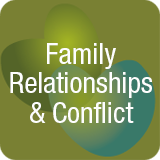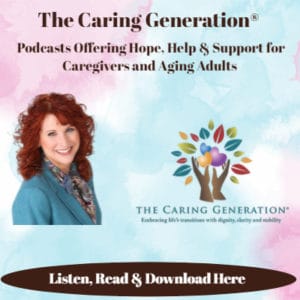Imperfect Family Relationships
 Imperfect family relationships impact caregiving relationships. When families come together in caregiving situations, at family or holiday reunions, or when family members interact in the general course of life, there are often past relationship glitches or hurts that remain an underlying current.
Imperfect family relationships impact caregiving relationships. When families come together in caregiving situations, at family or holiday reunions, or when family members interact in the general course of life, there are often past relationship glitches or hurts that remain an underlying current.
We so often hear others tell us to “get over it” when discussions of actions that our parents committed years ago come into conversation or when we discuss how relationships with our brothers or sisters are imperfect. The reality is that family relationships are often imperfect and this fact is brought into clear focus when caregiving becomes a family responsibility.
Does Caregiving Feel Like Fighting an Uphill Battle?
Watch More Videos About Caregiving and Aging on Pamela’s YouTube Channel
Caregiving relationships are often unequal with one person contributing more in the way of effort, time, or money than another. Care recipients may not always be appreciative of the efforts of family caregivers. In my book, The Caregiving Trap: Solutions for Life’s Unexpected Changes® imperfect family relationships are discussed as well as the importance of discussions involving beneficial and necessary conversations of care.
Many times deep introspection is required to help us improve family relationships. Family counseling and support groups may be beneficial toward working through challenging relationships.
Many times moving forward requires changing the way we think about a situation rather than hoping that others will change their actions or behaviors. Sometimes we have to let go of the idea that it is possible to control the outcome of a situation or control the way others—especially family members— think, respond or act.
How to Move Past Imperfect Family Relationships
Judith Sills, Ph.D., in her article, “Let it Go,” provides six tips to move forward and to move past poor choices and imperfect relationships.1 These include: letting go of the past, discarding memorabilia, making amends, changing the story you tell yourself, forgiving, and learning to be present. While these tips may not be easy to implement, these concepts are valuable if one wishes to move forward.
How many of us have family or friends in our lives that constantly complain but never take action? When we receive a phone call or spend time with these complainers our first inclination is to run the other way.
Some of us feel guilty that we are unable to be more supportive. Rather than being held captive by a complainer, you might say, “I have three minutes to listen,” and then, “I hear your concerns. Have you thought about what changes you’d like to make?” This statement allows the listener to put a time frame on participation in negative talk and to escape a repeated situation that may permanently damage a relationship.
Forgiveness is a Gift
In moving forward to improve imperfect family relationships there is the aspect of forgiveness. Many individuals hold onto hurts for a lifetime and are angry that the other person in the relationship was not so similarly harmed or derailed.
Forgiveness is a gift we give to ourselves in that we decide that we’ve been holding onto an issue for too long and we realize that continuing to be angry no longer serves us. Mistakes and injustice happen; life is not fair.
It is up to us to decide when we’ve been hanging onto hurt for too long and to move ahead with our life. We regain our self-esteem when we decide not to remain a victim or to continue to be a participant in an imperfect situation.
Visit Pamela’s Caring for Aging Parents Blog for More Helpful Caregiving Tips, Articles, and Podcasts.
1. Sills, Judith Ph.D., “Let it Go,” Psychology Today, November/December 2014. p, 55-59.
©2014, 2021 Pamela D. Wilson, All Rights Reserved.



